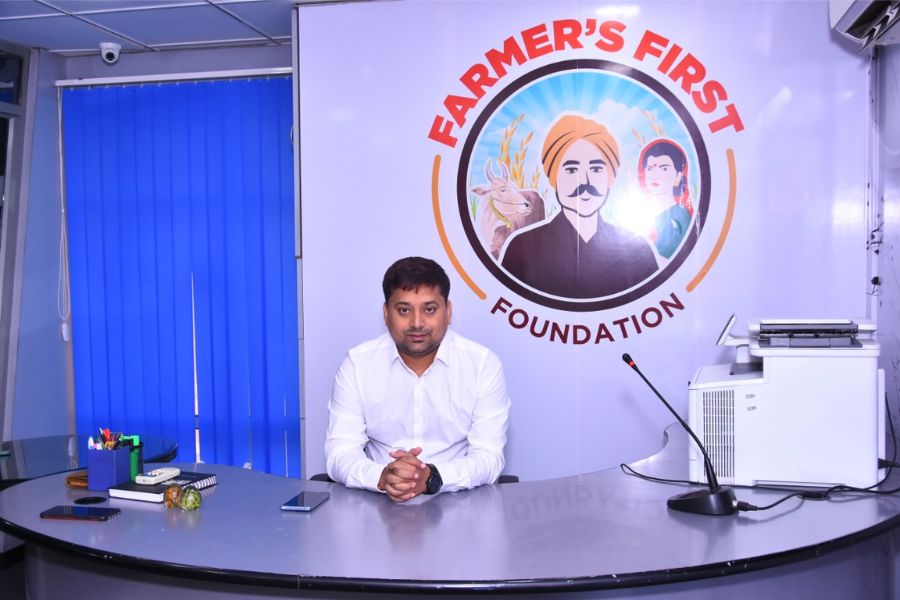Featured
Chakradhar, an unsung hero helping distressed tenant farmers in Telangana

Tea-vendor-turned-entrepreneur Gadhagoni Chakradhar Goud doesn’t find happiness in stashing cash bundles in the safe or seeing his bank accounts swelling. For him, pleasure comes from his hard earned money wiping the tears of a bereaved tenant farmer’s family. Or, in preventing a farmer from abruptly ending life, and making him a fellow entrepreneur.
Chakradhar, whose life is a perfect live example for the ‘Rags to Riches’ idiom, spends half of his income on helping poor tenant farmers. Having been supporting the farmers in different ways since his young age, he founded Farmers First Foundation in 2020, to extend the help in an organized manner.
He succeeded in preventing many farmers from committing suicide by extending support to shape their future. For instance, when he knew from his volunteer about a farmer in Tirupati attempting suicide, Chakradhar arrived there and extended Rs 2 lakh help to enable him to buy an autorickshaw. Now, the farmer-turned-auto-owner is leading a happy life with his family, taking care of 8 women of three generations dependent on him.
Another distressed farmer rescued from suicide by Chakradhar in Hyderabad has married his daughter to a police sub-inspector.
Who is Chakradhar Goud?
Now 35, Chakradhar Goud was born in a poor family in Siddipet district of Telangana. His father was a van driver. With it becoming difficult for the five-member family to survive on his meager income, the family ran a small tea stall in Siddipet. Like his elder brother and younger sister, Chakradhar used to go to school and work at the tea stall during free time.
In 2005, he moved to Hyderabad in search of a job, even before completing his graduation. He worked as a clothes vendor in the streets and asba helper in a disposable cups company, before joining as a loans executive at a leading private bank.
During this period he did his graduation and LLB through correspondence course and learned computer. It was because of the helping hand extended by his friends settled abroad; he became an entrepreneur by establishing a small company to execute software projects. “There was no looking back. I entered real estate also simultaneously and this CLIX SENSE group took birth. Now, there are 50-55 staff in my enterprises”, he reveals.
Though he didn’t have any agriculture background, his passion to work for the betterment of farm community kept increasing by the day. Friends convinced him to go in an organized way to help farmers. He registered Farmers First Foundation in 2020. He and his wife are directors and they don’t accept contributions. “When people approach us seeking to join our mission, we guide them to help the farmers directly”, he said.
Three pronged approach to help tenant farmers
In the last three years, Chakradhar helped 300 agriculture families that were distressed by the unnatural exit of their breadwinners from the world. Through his volunteers in the villages across Telangana, he would get the actual reasons for the farmer’s suicide ascertained and take a decision on the kind of help to be extended to the family. From his experience, Goud realized that moral support and advices are secondary for families that are under pressure from the financiers.
“They can think of tomorrow, only when they are out of the stress today”, he believes.
“A vast majority of the nearly 8000 farmers suicides reported since formation of Telangana state in June 2014 are tenant farmers. They borrow for cultivation and, if the crop fails, they are under tremendous stress of loss on one side and the pressure to clear the debts on the other. This gives birth to suicidal tendencies”, he analyses.
Apart from 300 bereaved tenant farmers families, the Foundation so far extended help to about 100 tenant farmers to diversify and weddings of their daughters. “Mere mangalsutra and toe rings will not help perform a wedding. There are many things, many requirements. That’s why I extend financial support, rather than forcing the family to perform the wedding with the material we give” Goud explains.
During the peak of COVID-19 pandemic, he supplied 2.5 lakh meals, at the rate of 2,000 a day, to the people in need.
On a Mission to rationalize Rytu Bandhu scheme
Chakradhar Goud is now on a mission to convince the Telangana government to put a ceiling on the landholding for eligibility for benefit under Rytu Bandhu scheme. Having conducted surveys and collecting data, he stresses that farmers holding more than 5 acres of land should be excluded from the scheme. “A farmer who owns more than five acres of cultivable land should ideally have the capacity to cultivate on his own. Most such farmers prefer to lease out their lands to tenant farmers, than dedicating their time for cultivation. Thus, extending the Rytu Bandhu scheme benefits to such landholders is injurious to the exchequer “, he says.
According to the estimates prepared by Chakradhar, about Rs 6000-7000 crore would be saved every year, if the big landholding farmers are excluded from the scheme.
The money saved thus should be spent on further support to the genuine cultivators. He bats for rationalization of the farm budget (allocation to farm sector in the budget).
Chakradhar also insists that like the budget for defense, there should be a separate budget for kisaan community. “Jai Jawan – Jai Kisaan’ is our slogan hence we should have equal respect for the two organs in our budget”, he argues.
Chakradhar is now gearing up for a legal battle against the indiscriminate implementation of the Rytu Bandhu scheme in Telangana. He is gathering public support, before raising a public interest litigation. “The fight will go on till the goal to exclude rich farmers from the scheme is achieved”, he stated.
Will quit business, if I join politics: Chakradhar
Chakradhar is not averse to politics. “I will enter politics only if I am convinced that my presence would help the farmers and the farm sector. When politics become my career, I will cease to be a businessman”, he declares. Chakradhar strongly believes that politicians should not have businesses and businessmen should not enter politics because the objectives are obviously contradictory. Facebook Link – https://www.facebook.com/politicallaboratory/
Featured
Nima Sulaiman joins HiLITE Group Board, her father gifts her a Porsche
Nima expressed her gratitude for the opportunity and her eagerness to contribute to the group’s success.

In a move signalling a generational shift in leadership and a commitment to empowering women in the business world, Nima Sulaiman, the daughter of HiLITE Group Chairman P. Sulaiman, has been welcomed onto the board of directors with a stunning gesture—a Porsche worth Rs 3 crore.
At just 18, Nima began her journey with HiLITE Group as a customer service trainee at Hug a Mug Cafe. From there, she transitioned to management roles, showcasing her talent and dedication. With a B.Sc in Economics from the University of London in Singapore, Nima brings a unique blend of academic prowess and practical experience to her new position.
As the Director of HiLITE Urban, a subsidiary of HiLITE Group, Nima is poised to continue the company’s legacy of excellence in construction and development. With a focus on providing quality living spaces and international standards in India, HiLITE Group has been instrumental in transforming Kozhikode city with its innovative projects that include premium residential buildings, ultra modern business parks, state-of-the-art malls and world-class entertainment theaters.
Group Chairman P. Sulaiman expressed his sentiments regarding his daughter’s recent appointment within the Group. He said, “I am immensely proud of Nima’s accomplishments and firmly believe that she is capable to take on greater responsiblities. HiLITE Group has always shed light on the significance of acknowledging and empowering women in leadership positions.” He further emphasised, “The emotional intelligence that women bring to the table is pivotal for fostering effective leadership and establishing trust.”
Nima, in turn, expressed her gratitude for the opportunity and her eagerness to contribute to the group’s success. “Inspired by my experiences visiting renowned malls worldwide, I strive to enrich the atmosphere of HiLITE malls and other projects, infusing them with vibrancy and youthfulness,” she said.
The appointment of Nima Sulaiman to the board of directors represents a significant milestone for HiLITE Group and a testament to the company’s commitment to innovation and inclusivity in the business world. As Nima takes on her new role, she stands as a beacon of inspiration for young women entrepreneurs in South India and beyond.
Featured
Steps to effective retirement planning
The importance of retirement planning depends on ensuring you have adequate funds to live comfortably after you stop earning a stable income.

Retirement planning is a critical aspect of financial stability that often goes overlooked until it’s too late. In India, where the culture of savings is ingrained yet formal retirement planning is still evolving, understanding, and initiating a retirement plan is more crucial than ever.
The importance of retirement planning depends on ensuring you have adequate funds to live comfortably after you stop earning a stable income. It is not only about saving a part of your earnings but also about investing in yourself. Here are some crucial reasons to begin retirement planning – combating inflation, securing financial freedom, managing medical expenditures, maintaining your living standard, supporting family requirements, meeting post-retirement goals, preparing for unanticipated circumstances, and leaving a legacy for dependents.
Here are ways to effectively plan your retirement –
Ø Utilise an online retirement calculator
An important instrument for planning, an online retirement calculator can assist you estimate how much you require to save to live a post-retirement life. It factors in your existing age, savings, retirement age, investments, and anticipated inflation rates.
Anjali is looking to retire at the age of 60 with a lifestyle that needs Rs 50,000 per month. Utilising an online retirement calculator, she considers her existing age of 30, anticipated inflation of 6 per cent and prevailing savings. The calculator estimates she needs a corpus of approximately Rs 2.5 crores to sustain her retirement life, helping her strategise her savings and investments accordingly.
Ø Start early
The sooner you start, the more you benefit from compound interest. Even starting small can lead to substantial growth over decades.
Imagine Rohit, who starts saving Rs 5,000 a month at age 25 in a mutual fund that averages an 8% annual return. By the time he turns 60, his investment would have grown to over Rs 1.50 crore, thanks to compound interest. In contrast, if Priya starts saving the same amount at 35 under the same conditions, she would accumulate about Rs 67 lakhs by age 60. The decade-long head start allows Rohit’s investments more time to compound, significantly impacting his retirement corpus.
Ø Create a retirement budget
Estimate your post-retirement expenses, considering inflation and changing lifestyle needs. Including fixed expenses, healthcare, leisure, and unexpected costs.
Vijay, nearing retirement, lists down his monthly expenses including groceries, utilities, healthcare, and leisure activities like travel and hobbies. Considering inflation, he predicts his current monthly expense of Rs 30,000 will rise to Rs 80,000 by the time he retires. This projection helps him understand how much he needs to save to maintain his lifestyle post-retirement.
Ø Opt for a pension plan
Investing in pension plans offered by insurance companies can guarantee a steady income post-retirement. They also provide tax benefits under Section 80C.
Raj invests in a pension plan that promises a monthly income of Rs 20,000 after retirement. This plan not only secures his future financially but also offers tax benefits today, making it a win-win investment for his retirement years.
Ø Diversify your investment portfolio
Do not put all your eggs in one basket. Invest in a mix of asset classes including equity, debt, mutual funds, and real estate. Consider your risk appetite and investment horizon.
Meena, an investor, allocates her savings across different asset classes—40 per cent in equity for growth, 30 per cent in bonds for stability, 20 per cent in mutual funds for diversified exposure, and 10 per cent in real estate for passive income. This diversification helps balance her risk and provides multiple growth avenues, ensuring her portfolio is well-equipped to handle market volatility.
Ø Maximise your EPF and PPF contributions
The EPF or employee provident fund and PPF or public provident fund are excellent tax-saving instruments that offer secure, high-interest earnings for retirement.
Sunita contributes the maximum allowable limit to her EPF and PPF accounts every year. These contributions not only reduce her taxable income but also accumulate tax-free earnings, creating a significant retirement fund that’s secure and government-backed.
Ø Maintain an emergency fund
Ensure you have an emergency fund worth at least 6-12 months of living expenses. This fund should be easily accessible and kept separate from your retirement savings.
Deepika saves six months’ worth of expenses in a liquid fund, separate from her investments and retirement savings. This fund acts as a financial cushion during unexpected events, such as medical emergencies or sudden unemployment, ensuring her long-term plans remain undisturbed.
Ø Invest in NPS or national pension scheme
The NPS is a government-backed retirement planning instrument that is market-linked and offers various fund options based on your risk tolerance.
Karan opts for the NPS, choosing a mix of equity, corporate bonds, and government securities, aligning with his moderate risk appetite. This allows his retirement savings to grow with the market while offering the flexibility to adjust the asset allocation as he gets closer to retirement.
Ø Educate yourself financially
Stay informed about financial planning, investment options, tax laws, and market trends. Knowledge is power, especially when it comes to managing your money.
Neha spends her time reading blogs linked with finance, attending workshops, and consulting with financial professionals. This constant learning equips her with considerable knowledge to make better decisions about her tax planning, investments, and retirement plan, ensuring she enhances her financial potential.
Ø Assess as well as adjust your plan periodically
Your retirement plan should adapt to your changing life circumstances. Annually, review your assets, savings, and goals and make any necessary modifications.
Every year, Amit updates his retirement plan to reflect changes in his income, spending, and life goals. This regular review keeps him on pace with his retirement objectives, allowing him to make necessary modifications to his savings rate and investment selections.
Final thoughts
Retirement planning is more than a financial responsibility; it is a commitment to your future self. Beginning today not just secures your financial future, but even endows you with mental peace and the opportunity to spend your retirement years as you see fit. Attaining a comfortable retirement involves vision, a proactive attitude, and discipline. Note that it is never too early or very late, to begin with retirement planning. The steps you take now can result in a better and more secure tomorrow.
Featured
Supreme Court AOR firm Vedic Legal settles the debate: Can ancestral property be sold without the consent of successors?

New Delhi (India), June 24: Ancestral property is a valuable asset that is passed
down from one generation to another. It is a symbol of family heritage and pride
that holds significant sentimental value for many families. However, the question
that has been long debated is whether ancestral property can be sold without the
consent of all successors.
According to Indian law, ancestral property is considered to be the collective
property of all successors of the original owner. As a result, the sale of ancestral
property without the consent of all successors is generally not allowed. The
reasoning behind this is that ancestral property is seen as a collective asset, and
all successors have an equal right to it.
However, in certain cases, the sale of ancestral property without the consent of all
successors may be allowed by law. For instance, in cases where the owner of the
property has died intestate and there is no will or agreement in place, legal heirs
may be able to sell off the ancestral property without seeking consent from all
other successors.
It is important to note that the rules regarding the sale of ancestral property
without consent may vary from state to state. Therefore, it is essential to consult a
lawyer before making any decision regarding the sale of ancestral property.
Supreme Court Advocate on record firm with Vedic Legal, a renowned law firm
specializing in property and succession law, recently settled a landmark case in
the Supreme Court. The case involved the sale of ancestral property without the
consent of all successors, and Supreme Court AOR firm Vedic Legal argued that
such a sale was not permissible under Indian law.
The verdict of the Supreme Court, based on Supreme Court AOR firm Vedic Legal
arguments, confirmed that ancestral property could not be sold without the
consent of all successors. This ruling has set a precedent for future cases and has
provided clarity on a contentious issue that has long been debated.
The complexity of the issue of selling ancestral property without the consent of
successors is not lost on legal experts. It is crucial to consider the legal and
ethical implications of such a sale, as it can have significant consequences for all
parties involved.
In some cases, however, selling the ancestral property without the consent of all
successors may be the best option. For example, in cases where there are
disputes between heirs or when some heirs are not reachable, selling ancestral
property without the consent of all successors may be allowed by law.
Additionally, in certain circumstances, selling the ancestral property without
consent may be the only way to resolve financial difficulties faced by the owners of
the property. This may include situations where the owners require funds for
medical treatment or other urgent needs.
However, any decision to sell the ancestral property without the consent of all
successors should be made after careful consideration and consultation with legal
experts. It is essential to ensure that all legal requirements are met and that the
rights of all parties involved are protected.
The sale of ancestral property without consent is a complex issue that requires
careful consideration and legal guidance. While it may be possible in some cases,
it is generally accepted that ancestral property is a collective asset that cannot be
sold without the consent of all successors.
The recent landmark case settled by Supreme Court AOR firm Vedic Legal in the
Supreme Court has provided clarity on the legal aspect of selling ancestral
property without the consent of successors. It has set a precedent for future cases
and has highlighted the importance of seeking legal guidance before making any
decision regarding the sale of ancestral property.
-

 2024 Lok Sabha Elections15 hours ago
2024 Lok Sabha Elections15 hours agoPM Modi calls for high voter turnout in second phase of Lok Sabha elections 2024, says your vote is your voice
-

 2024 Lok Sabha Elections9 hours ago
2024 Lok Sabha Elections9 hours agoLok Sabha election 2024: Nearly 50% voter turnout recorded in second phase till 3 pm
-

 2024 Lok Sabha Elections8 hours ago
2024 Lok Sabha Elections8 hours agoElection Commission books BJP MP Tejasvi Surya for seeking votes in the name of religion
-

 India News14 hours ago
India News14 hours agoSalman Khan house firing case: NIA interrogates arrested shooters Sagar Pal, Vicky Gupta for three hours
-

 2024 Lok Sabha Elections12 hours ago
2024 Lok Sabha Elections12 hours agoLok Sabha elections 2024: 102-year-old man walks to polling booth to cast his vote in Jammu

